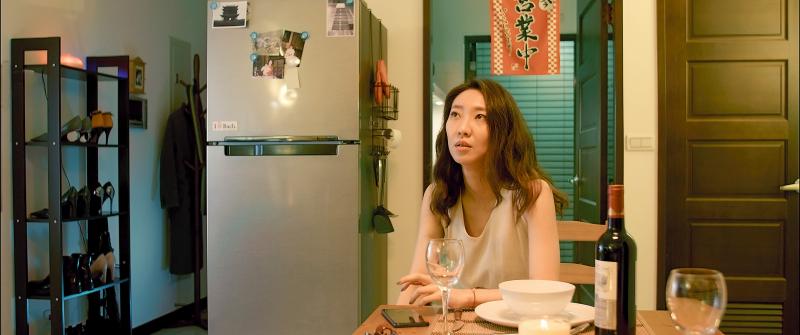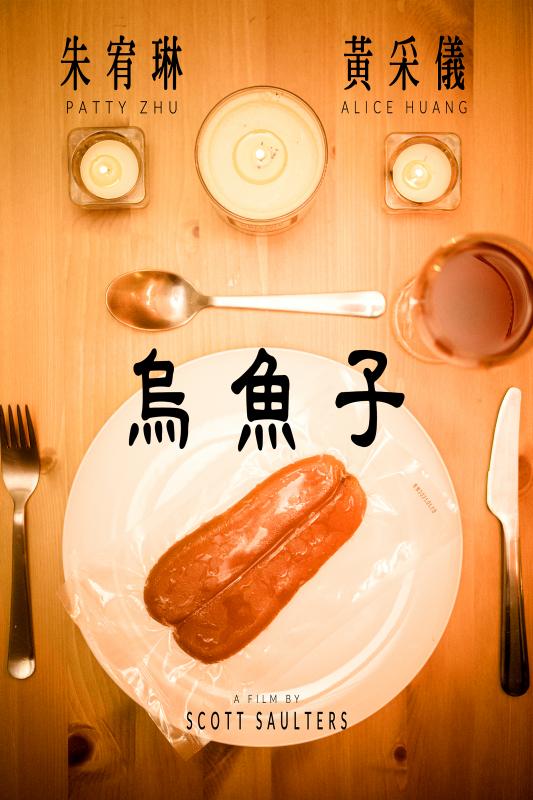Scott Saulters wasn’t sure if his film had just taken one of the two top prizes at a recent film competition.
Although Saulters has been in Taiwan for 15 years and is proficient in Mandarin, the award ceremony for the inaugural “Bi Tian Iann” (眯電影) short film contest was conducted entirely in Hoklo (also known as Taiwanese), a language he can’t speak.
“I thought I heard it, but I didn’t want to look too excited,” he says.

Photo courtesy of Scott Saulters
Despite his limited command of the tongue, Saulter’s entry, Wu Yu Tzu (烏魚子, mullet roe), took first place in the amateur category of the competition, which called for three-minute submissions with at least 80 percent of the dialogue in Hoklo.
The contest was organized by PTS Taigi — the PTS’ Hoklo-language channel launched in July last year, along with the Taipei Film Commission and the Taipei Culture Foundation.
“I wasn’t really too concerned about making a film in a language I cannot speak, as I can speak Mandarin, which is close enough to not make it a completely foreign experience,” Saulters says.

Photos courtesy of Scott Saulters
It helps that Saulters’ partner, Patty Zhu (朱宥琳), is a Taiwanese stage actress whose mother tongue is Hoklo. Zhu, who stars in Wu Yu Tzu, says the two began writing and shooting shorts after the COVID-19 pandemic put her out of work.
Saulters, who works for a gaming graphics company, returned from a business trip to the US right before the 14-day mandatory quarantine was imposed. Believing that they would be permanently stuck at home, the two started setting up the scenes for Wu Yu Tzu.
“The [Centers of Disease Control] told me two days later that they had made a mistake,” Saulters says. “But we had already made the plans.”
RHYTHMS OF HOKLO
They looked up film competitions and found that “Bi Tian Iann” fit the timeframe and parameters the best — except for the language. Saulters already knew the script pretty well when they switched it to Hoklo, though he still had some difficulties editing since the scenes weren’t filmed in order. As a musician, he treated the sounds as musical notes during the post-production process.
“There are a lot of nuances to the [Hoklo] language … that give it its beauty,” Saulters says. “I perceive them as music qualities, similar to rhythmic motifs, melodic inflections, variations in tempo and so on. I allow this almost unconscious information to influence and guide the visual structures.”
Zhu, who grew up in Taipei, says she feels that when Hoklo is used in a local film or drama production, it almost always features old people in the countryside, temple performers or stereotypical tropes such as gangsters or loud aunties. When her colleagues were assigned Hoklo roles, she noticed they would automatically assume exaggerated personas to cater to this stereotype.
“It’s as if the language changes their character or the settings,” she says. “The transformation happens so naturally, but it shouldn’t be this way.”
As someone who says that the language “makes her feel like home,” Zhu feels uncomfortable with this continued portrayal. The situation contrasts with the music industry, where Hoklo pop, rock and rap enjoy considerable popularity.
“Hoklo dramas generally cater to older audiences,” she says. “I wanted to portray Hoklo in a modern setting, featuring more relevant themes and dialogue.”
However, the reality is that Hoklo is not heard very often in Taipei. “The settings still need to be logical,” Zhu says. “It’s implausible to show crowds chattering in Hoklo on Zhongxiao E Road.”
The resulting film portrays a simple phone conversation between a woman and her mother. Zhu’s character is asking her mother how to prepare mullet roe for a dinner guest, but the mother is more interested in her love life. It’s one of those seemingly casual but loaded conversations between family members in Taiwan, and Zhu feels that Hoklo can better express this roundabout way of speaking.
“The language needs to be modernized in order to be preserved,” Zhu says. “Only by presenting it in new ways can we open more avenues and possibilities for its development.”

Most heroes are remembered for the battles they fought. Taiwan’s Black Bat Squadron is remembered for flying into Chinese airspace 838 times between 1953 and 1967, and for the 148 men whose sacrifice bought the intelligence that kept Taiwan secure. Two-thirds of the squadron died carrying out missions most people wouldn’t learn about for another 40 years. The squadron lost 15 aircraft and 148 crew members over those 14 years, making it the deadliest unit in Taiwan’s military history by casualty rate. They flew at night, often at low altitudes, straight into some of the most heavily defended airspace in Asia.

Many people in Taiwan first learned about universal basic income (UBI) — the idea that the government should provide regular, no-strings-attached payments to each citizen — in 2019. While seeking the Democratic nomination for the 2020 US presidential election, Andrew Yang, a politician of Taiwanese descent, said that, if elected, he’d institute a UBI of US$1,000 per month to “get the economic boot off of people’s throats, allowing them to lift their heads up, breathe, and get excited for the future.” His campaign petered out, but the concept of UBI hasn’t gone away. Throughout the industrialized world, there are fears that

Taiwan’s democracy is at risk. Be very alarmed. This is not a drill. The current constitutional crisis progressed slowly, then suddenly. Political tensions, partisan hostility and emotions are all running high right when cool heads and calm negotiation are most needed. Oxford defines brinkmanship as: “The art or practice of pursuing a dangerous policy to the limits of safety before stopping, especially in politics.” It says the term comes from a quote from a 1956 Cold War interview with then-American Secretary of State John Foster Dulles, when he said: ‘The ability to get to the verge without getting into the war is

Like much in the world today, theater has experienced major disruptions over the six years since COVID-19. The pandemic, the war in Ukraine and social media have created a new normal of geopolitical and information uncertainty, and the performing arts are not immune to these effects. “Ten years ago people wanted to come to the theater to engage with important issues, but now the Internet allows them to engage with those issues powerfully and immediately,” said Faith Tan, programming director of the Esplanade in Singapore, speaking last week in Japan. “One reaction to unpredictability has been a renewed emphasis on